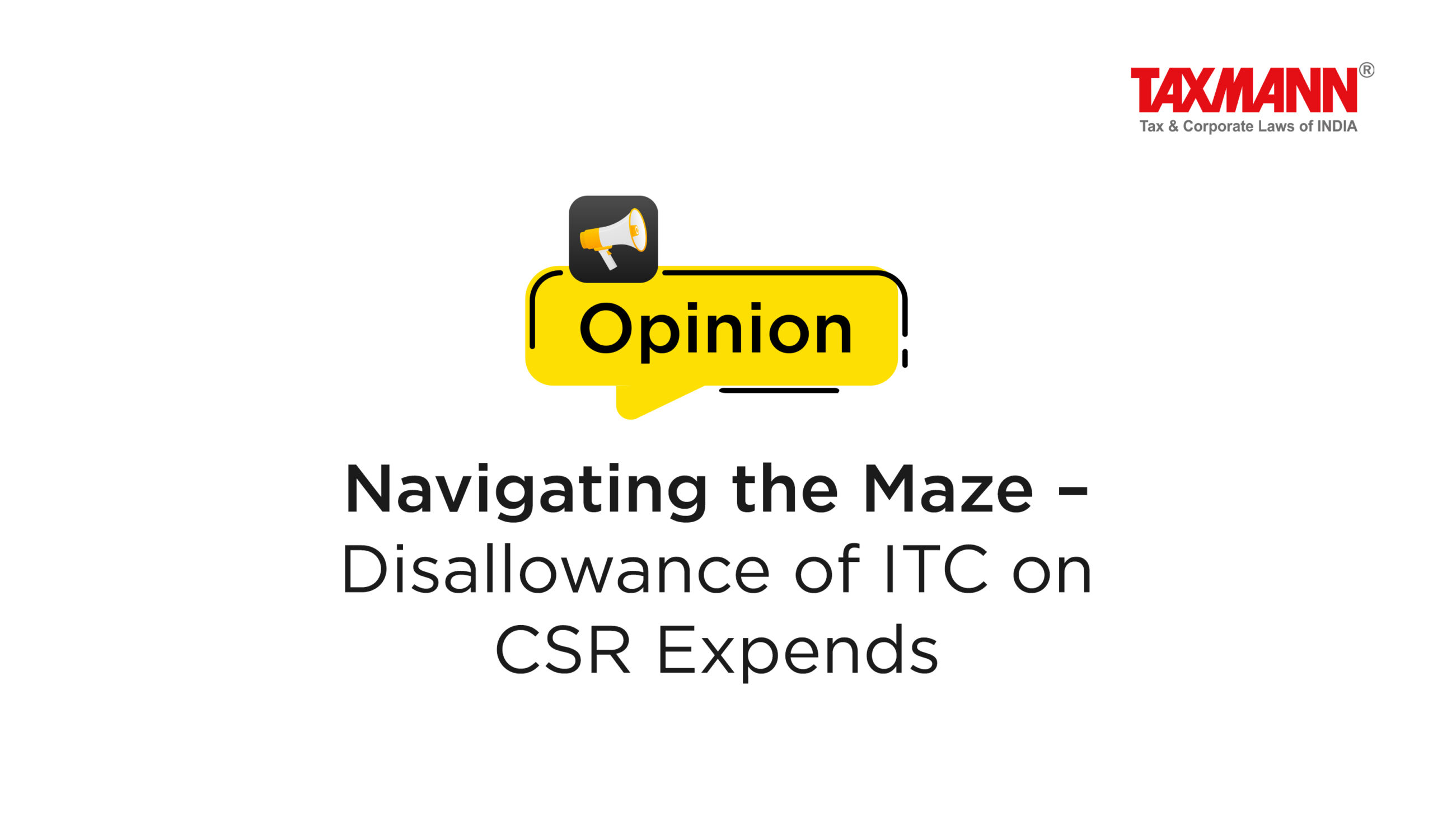[Opinion] Navigating the Maze – Disallowance of ITC on CSR Expends
- News|Blog|GST & Customs|
- 3 Min Read
- By Taxmann
- |
- Last Updated on 22 June, 2023

The Goods and Services Tax (GST) is recognised as the most comprehensive and all-encompassing reform in the realm of indirect taxation, essence of which lies in ensuring uninterrupted and seamless stream of Input Tax Credit (ITC). While ITC has been the focal point of numerous GST discussions and has undergone countless deliberations throughout the years, the million-dollar question is whether the objective of the cornerstone of robust GST architecture i.e., seamless ITC flow, has been accomplished? This lingering question is one of the crucial matters which are endeavoured to be addressed by the government.
Interplay between CSR and ITC under GST
In this changing scenario, the Government of India (GOI) is persevering significant developments in ITC provisions to unveil the uncertainties prevailing in the industry. One of such longstanding debates was ITC eligibility on corporate social responsibility (CSR) spends. Companies surpassing certain prescribed thresholds in terms of net worth, turnover or profit are mandated by the Companies Act, 2013, to undertake CSR activities (at least 2% of average net profits made during three immediately preceding FYs), thereby prompting a sharp rise in related expenses. Further, the Ministry of Corporate Affairs (MCA), vide its circular, has delineated certain modes of CSR spending viz. ‘Contribution routes’ or ‘Activities route’. Albeit cash donations lie outside GST ambit, the legislation does not explicitly address provisions for donations in kind (goods or services), raising a crucial question – Are GST payments made on procurements for CSR expenditure eligible for ITC?
The ongoing discourse is premised on consideration of two fundamental aspects –
i) Whether such CSR spending can be deemed to be incurred in ‘the course or furtherance of business, and
ii) If there are any explicit restrictions for ITC on respective spends within arrangements of GST law.
This long-lived dubiety about ITC eligibility on CSR expend has been carried forward as a legacy from the erstwhile regime into the current GST era. The need for certainty regarding this issue was further amplified, particularly in light of substantial CSR expenditures incurred post-pandemic and divergent tax positions adopted by the industry.
Proposal vide the Finance Act 2023 – An end to a prolonged dispute
As we are cognizant, Section 17 of the Central Goods and Services Tax Act, 2017 (CGST Act), provides for specific clauses to restrict ITC under GST. Captivatingly, the GOI vide the Finance Act 2023 has put forth a proposal to address aforesaid issue through insertion of a new restrictive clause (fa) under Section 17(5) of the CGST Act, which reads as follows:
“Goods or services or both received by a taxable person, which are used or intended to be used for activities relating to his obligations under corporate social responsibility referred to in section 135 of the Companies Act, 2013”
In view of the above, it may be inferred that the ITC shall not be available in respect of goods or services, or both received by a taxable person, which are used or intended to be used for activities relating to his obligations under CSR referred to in Section 135 of the Companies Act, 2013. However, said amendment is yet to be notified.
Seeking to address divergent views within the industry, the proposal seems to be driven by the twin rationale –
a) Increase in tax retention by the government for further societal contribution; and
b) Aiming to align it with direct tax laws where deductions are not permitted for various CSR expends.
Click Here To Read The Full Article
Disclaimer: The content/information published on the website is only for general information of the user and shall not be construed as legal advice. While the Taxmann has exercised reasonable efforts to ensure the veracity of information/content published, Taxmann shall be under no liability in any manner whatsoever for incorrect information, if any.

Taxmann Publications has a dedicated in-house Research & Editorial Team. This team consists of a team of Chartered Accountants, Company Secretaries, and Lawyers. This team works under the guidance and supervision of editor-in-chief Mr Rakesh Bhargava.
The Research and Editorial Team is responsible for developing reliable and accurate content for the readers. The team follows the six-sigma approach to achieve the benchmark of zero error in its publications and research platforms. The team ensures that the following publication guidelines are thoroughly followed while developing the content:
- The statutory material is obtained only from the authorized and reliable sources
- All the latest developments in the judicial and legislative fields are covered
- Prepare the analytical write-ups on current, controversial, and important issues to help the readers to understand the concept and its implications
- Every content published by Taxmann is complete, accurate and lucid
- All evidence-based statements are supported with proper reference to Section, Circular No., Notification No. or citations
- The golden rules of grammar, style and consistency are thoroughly followed
- Font and size that’s easy to read and remain consistent across all imprint and digital publications are applied



 CA | CS | CMA
CA | CS | CMA
